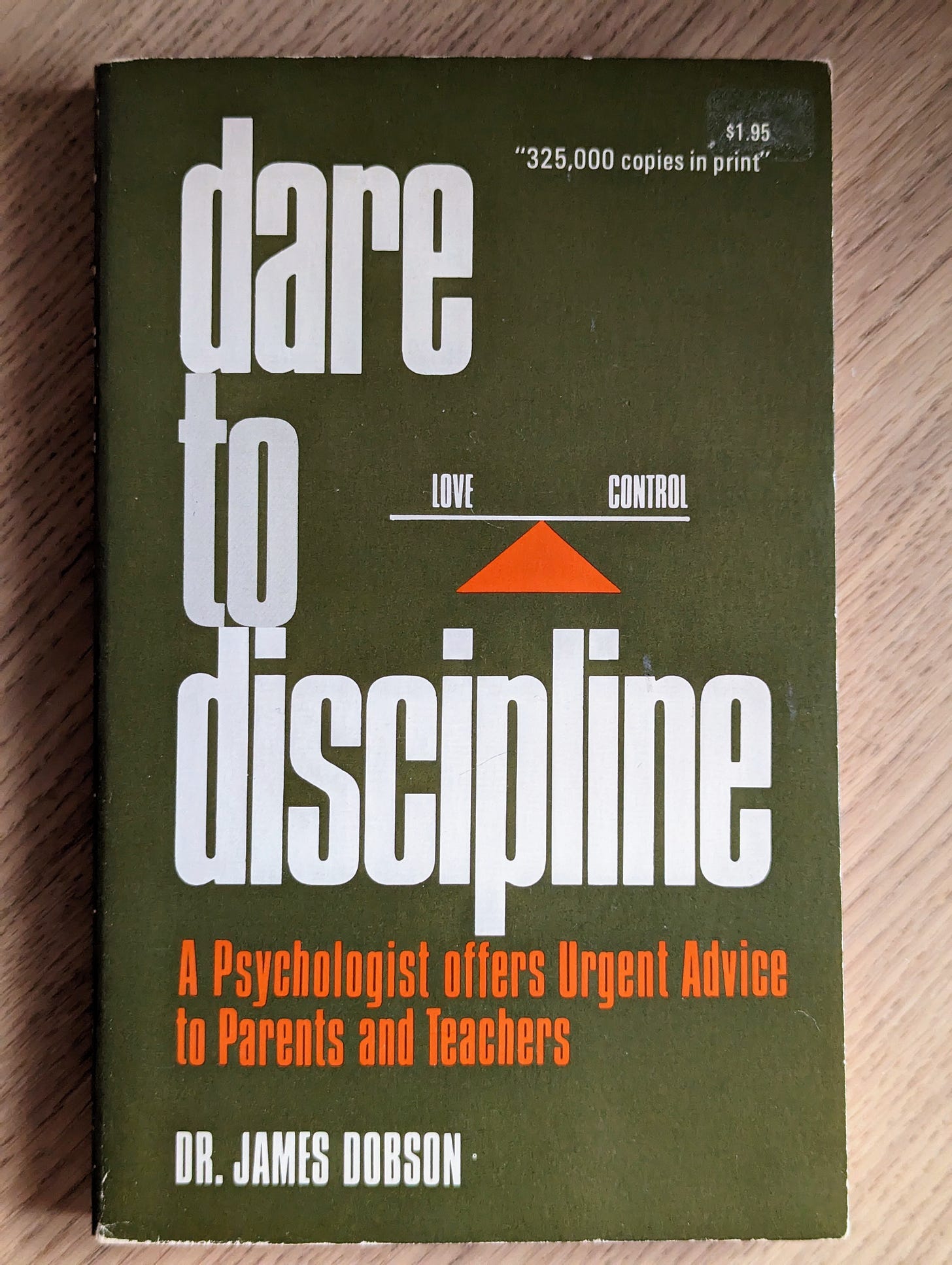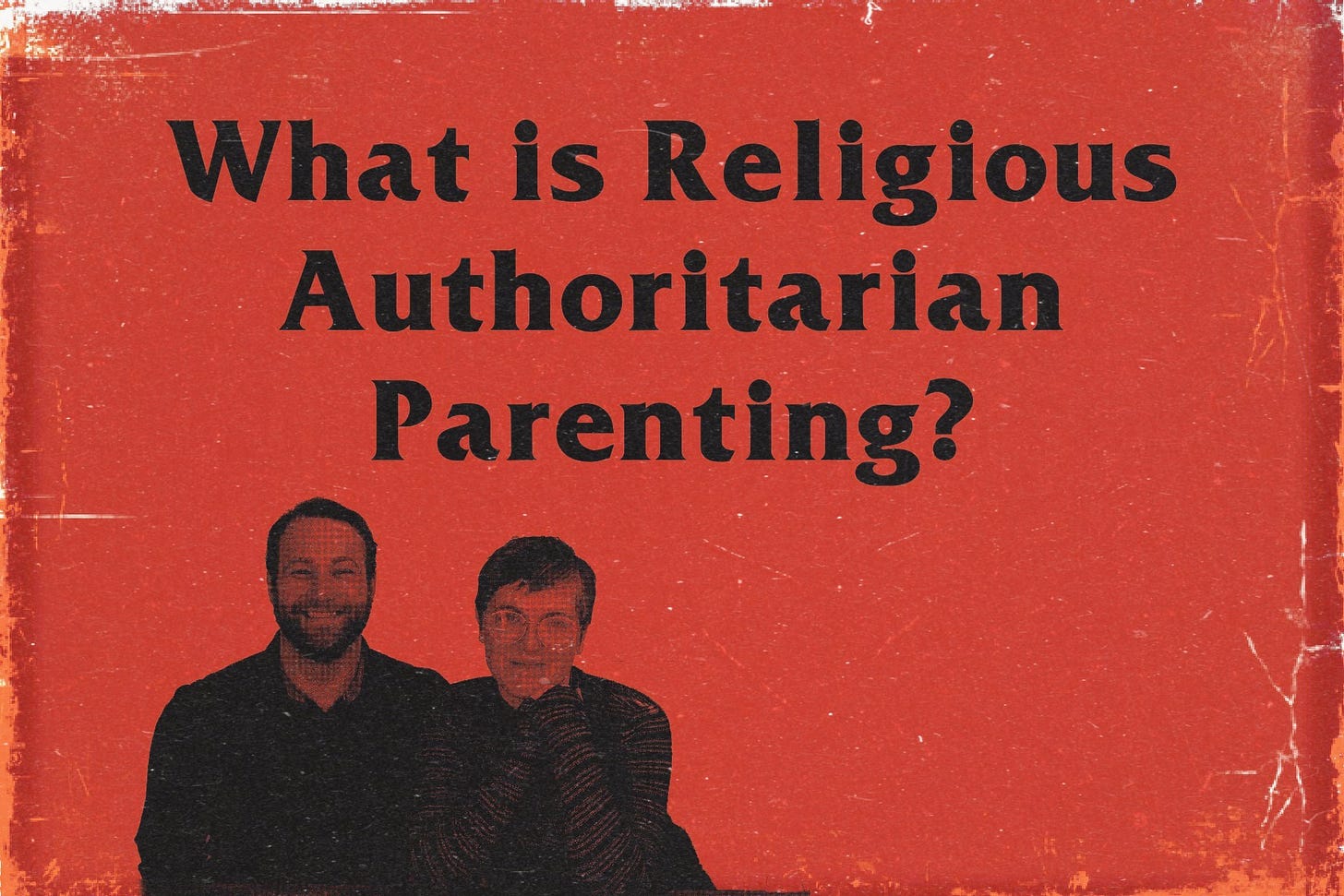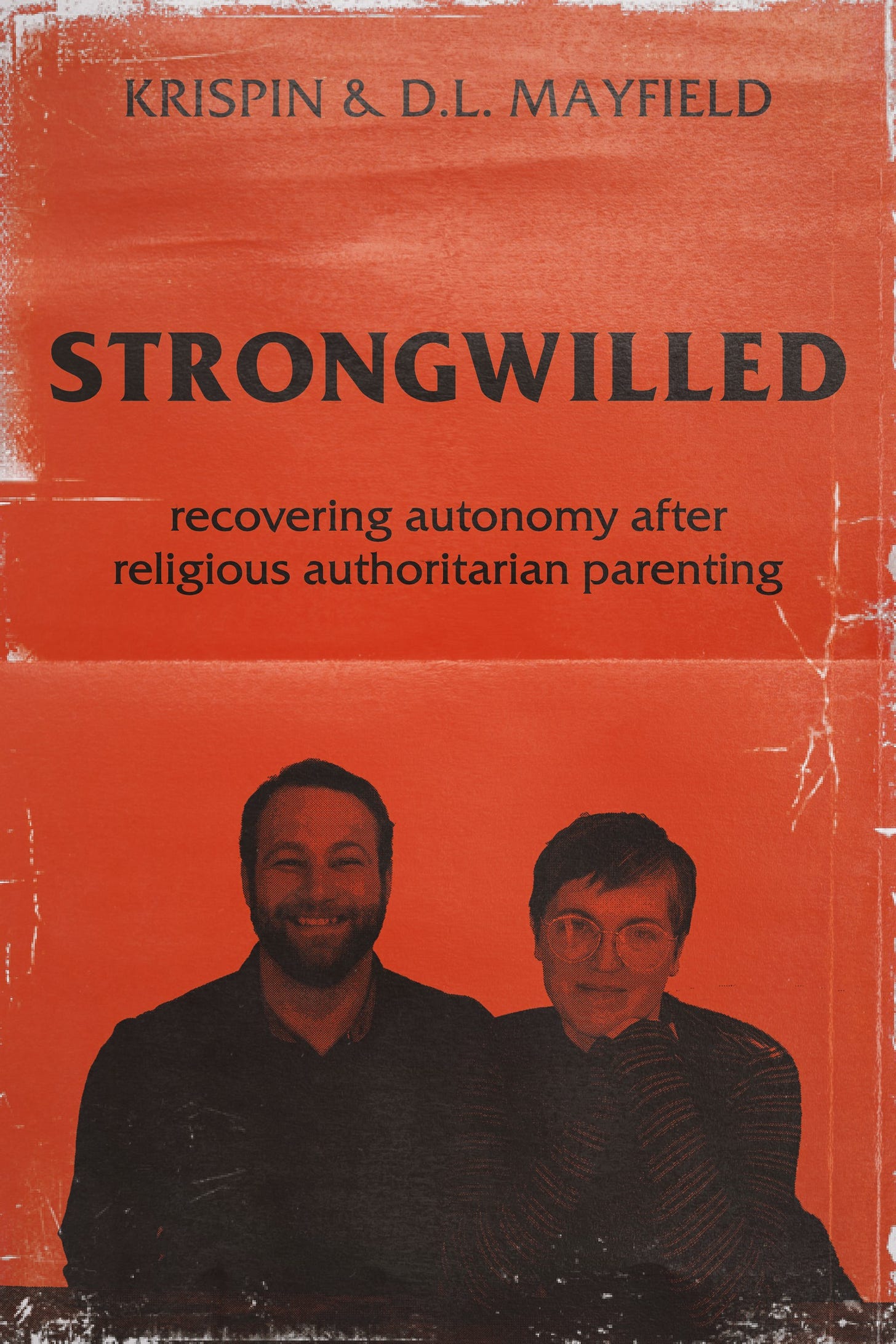Chapter 1: What is Religious Authoritarian Parenting?
And what are the long-term implications for both individuals and societies as a whole?
STRONGWILLED is a multimedia project centered on helping people recover autonomy after experiencing Religious Authoritarian Parenting. We are so glad you are here! Today our first chapter starts by outlining what exactly *is* Religious Authoritarian Parenting. For more info on us / the project, please see our About page. If you want to support our work and join our community, please consider becoming a paid subscriber!
First of all, let’s start with a few questions to reflect on:
As a child how important was obedience to your parents / caregivers?
What was your relationship to the term “strong willed” in childhood?
Did your parents make obedience to God / a sacred text an important part of their parenting philosophy?
Have you made major life decisions in order to avoid upsetting your parents or to keep them happy? (marriage, having children, where you live, regularly attending religious services)
Do you avoid telling your parents about your political views because of the conflict it creates?
Do you struggle to be assertive or set boundaries with authority figures?
Do you find it difficult to know your own life goals (or even preferences, like where you want to go to dinner)?
Do your parents criticize you (implicitly or explicitly) for being too permissive with your children?
Have you or are you currently debating going low- or no-contact with your parents due to their inability to respect your opinions, boundaries, and life choices?
If you answered yes to any of the above questions, you may have experienced Religious Authoritarian Parenting.
What is Religious Authoritarian Parenting?
Religious Authoritarian Parenting (RAP) is an approach to childrearing that prioritizes obedience to authority over all other aspects of childhood development, utilizing religion as further confirmation of the role humans play in submitting to authority. The goal of religious authoritarian parenting is to raise children who grow into adults that automatically submit to any authority that their parents consider to be God-ordained. This includes religious leaders, religious texts, husbands (in the case of women), and other approved authority figures like the police, government, teachers, and employers. Parenting practices revolve around developing a child’s desire to submit to authority, with a myriad of consequences (including corporal punishment) if the child does not obey immediately.
While healthy parents often teach obedience until their children are developed enough to make their own decisions, the goal of religious authoritarian parenting is to prevent the development of self-autonomy or individuality from happening at all. It aims to ensure that children remain within the religious hierarchical structures from childhood to adulthood, as parents transfer their authority to religious and government authorities. It’s based on the idea that humans, no matter their age, are untrustworthy and evil and require dominance by a deity. This deity uses the government, religious leaders, or family members to control humans, lest they engage in “self-will.”1 This style of parenting is designed to prime a child to stay within the religious community, to submit to the hierarchy of that system, to obey the norms of the community, and to continue on in those values and political identities for life.
Who were the Religious Authoritarian Parenting experts?
The STRONGWILLED project focuses on the time period in American publishing when Religious Authoritarian Parenting methods began to be both popular and widespread (approximately from 1970—present). While there are too many authors to name in this introduction, some of the biggest and best-selling names in this genre include:
Dr. James Dobson (founder of Focus on the Family, political lobbyist, and author of books like Dare to Discipline and The Strong-Willed Child
John MacArthur, non-denominational pastor and author of books like Successful Christian Parenting
Bill Gothard, founder of Institute for Biblical Life Principles (IBLP) a patriarchal fundamentalist group
Debi and Michael Pearl, authors of books such as To Train up a Child
Ted Tripp, author of Shepherding a Child’s Heart
The common link between these authors (and the myriad of copycats they spawned) is a patriarchal Christianity that was interested in helping parents raise children who would know their place in the God-given hierarchy of society.
While we are most familiar with white evangelicals, religious authoritarian parenting can occur in any hierarchical religious setting, and people from other faith traditions may recognize these similar dynamics in their upbringing2.

The Goals of Religious Authoritarian Parenting
RAP aims to form the kind of adult a child grows up to be, seeking to hold long-term influence over the child. There are four common areas that religious authoritarian parenting targets:
Unquestioning Obedience to God-ordained Authorities. For religious authoritarian parents, home is the training ground to develop obedience and submission to other authorities that the religious group deems God-ordained. Those raised in RAP homes may find themselves submitting to authority figures in a way that feels subconsciously automatic (“fawning” is the term developed by trauma therapist Pete Walker in his book CPTSD: From Surviving to Thriving)3. This was the goal of religious authoritarian parenting: to develop an automatically submissive response to authority.
Acceptance of Hierarchical Roles. RAP often has a focus on ensuring that children adopt roles that their parents want them to fulfill. Lindsay Gibson, author of Adult Children of Emotionally Immature Parents calls this “role coercion”. These roles often include heteronormative gender roles in the nuclear family, like expecting that a child assigned female at birth will grow up to be a submissive wife and mother. Role coercion also often includes religious role expectations (church-goer, regular temple-attender, missionary). There are other roles that religious authoritarian parents may push, including where to go to college (usually a religiously-affiliated institution, or perhaps attending close to home) or what career field their child chooses. The role coercion that occurs in religious authoritarian parenting often seeks to suppress queer sexuality or gender expressions, and instead puts primacy on creating a heterosexual patriarchal nuclear family that raises their children within the religious tradition.
Acceptance and Replication of Political Values. It’s normal to teach children values like honesty, integrity and kindness. However RAP has a focus on ensuring that children grow up to hold the same political values as their parents, often including homophobia, patriarchy/misogyny, and other values that marginalize certain groups. In white religious communities in the US, Republican politics are often emphasized to the point where it becomes hard to discern whether or not RAP is about religion or if it is actually about a political framework. RAP seeks to raise children that view the world identically to their parents, rather than developing their own identity and conclusions about the world.
Acceptance of Life-Long Parental Influence. Religious authoritarian parenting doesn’t have an expiration date, as it aims to ensure that parents hold significant influence over their children even into adulthood. In evangelical circles (which we’re most familiar with) there is slight variation: Bill Gothard and John MacArthuer both taught that parents always hold an explicit authority in their child’s life, even into adulthood. Others, like James Dobson, encouraged parents to create a psychological dynamic during childhood and adolescence that would set the child up to defer to parents no matter their age.
RAP’s Use of Spirituality/Religion
Regardless of the specific faith tradition, religious authoritarian parenting uses religion or spirituality in similar ways to produce submission in their children. Children are taught that their parents are an authority instituted by God, therefore when children obey their parents, they are obeying God (and, perhaps put more succinctly: when they disobey their parents, they are disobeying God). Children are taught that they are sinful and need an outside and external force to make them “good”. Most religious communities that encourage this parenting style have a belief in hell, which serves as an extra layer of control to encourage children to submit to parents. Children learn to squash their own autonomy and submit to their parents as a way of learning to submit to the God they are dependent on for salvation.
Our Thesis: Religious Authoritarian Parenting as a Political Movement
It is our belief at STRONGWILLED that religious authoritarian parenting wasn’t just a trend that dominated much of the religious parenting books in the United States from 1970 on. At its core RAP is a political movement designed to create people who would be responsive to authoritarianism and authoritarian leaders. Hoping to consolidate and maintain white, hereteo-normative, patriarchal power structures that privileged Christianity, the religious authoritarian parenting movement began to teach parents how to raise their children in a world that was increasingly pluralistic and moving towards social progress for minority groups, including Black people, women, immigrants, and the LGBTQIA+ community. The purveyors of this kind of parenting set out to specifically instruct caregivers to raise children who would learn about and embrace their God-given roles in a hierarchical society, and to never imagine “rebelling” the way that young people did during the 1960s4.
It’s no surprise that after half a century of intentionally teaching parents in religious communities to parent with these authoritarian parenting practices, 2024 is seeing a rising wave of authoritarianism across the globe, with the United States leading the way. As people pontificate about why so many people are being drawn to authoritarian leaders and the fear tactics they use to shore up power, it seems that many are overlooking this important and profoundly influential element.
During the second half of the 20th century, conservative leaders taught parents to create an authoritarian home where obedience to authority was the most important aspect of child rearing, priming children to grow into adults who would seek and support authoritarian political leaders5. Religious authoritarian parenting was a wide-spread movement that has wielded incredible political power. Not only that, but RAP methods have also led to long-lasting psychological impact among the millions and millions of children who grew up in an authoritarian family environment. While the parents who bought into religious authoritarian methods were promised a legacy of happy families full of well-behaved kids, the reality is that many of us who grew up in these households struggle with symptoms that match CPTSD: anxiety, depression, an increased risk for suicidality, and mental and physical health disorders, not to mention strained relationships with our caregivers. In future posts, we will unpack the personal impacts of these parenting methods, but for now we will focus on what the stated goals of these parenting methods were.
Parenting Styles & Terms
For the purposes of this project, we recognized we would need to be precise about the parenting philosophies we wanted to unpack. The various terms offered by parenting experts — permissive, authoritative, and authoritarian — didn’t quite seem to fit the lived experience of so many people. So, after years of research, we here at STRONGWILLED created our own term, and we would be curious to know if our definitions and terms fit your lived experience. We use the term Religious Authoritarian Parenting because it is rooted in the political philosophy of authoritarianism: the belief that individuals should submit to the (often God-ordained) authority of society, rather than engaging in personal freedom and individual autonomy.
The purveyors of religious authoritarian parenting — people like Dr. James Dobson, John MacArthur, Bill Gothard, Gary Ezzo and more — always insisted their methods were authoritative and not authoritarian6. We, however, disagree. We believe that RAP is most similar to intrusive parenting, a term used by Brian K. Barber and other scholars to describe parents that use methods to gain psychological control over their children. We’ll be writing later articles about the different types of parenting (permissive, authoritarian, authoritative), and where RAP fits in that framework.
Defining religious authoritarian parenting is just the beginning of naming its long-term impacts, both on political systems and on the individual level. We have a vested interest in not letting religious authoritarians be in charge of political systems, and we are interested in healing from the long-term impacts of having our autonomy and self-will disciplined out of us at key developmental stages. In the coming weeks and months we will release our content on the history of RAP and deep-dive into some of the main purveyors of this philosophy, as well as create community resources and discussions for people to begin the process of healing and reclaiming autonomy. Our hope is that together we can shape this project into a resource that is educational and collaborative.
To that aim, we believe that the most important aspect of understanding the impact of Religious Authoritarian Parenting is hearing the voices of those who grew up under these parenting practices.
Were you raised with a RAP principles?
Understanding whether you were raised with this parenting style and how it impacted you often requires some reflection. We’ve found that the signs of RAP can be seen both in childhood and in adulthood. Let’s go back to some of the questions we posed at the beginning and take some time to sit with them:
As a child what was your relationship to the terms “strong willed” or “obedient” in reference to yourself/ your siblings?
Have you made major life decisions in order to avoid upsetting your parents or to keep them happy? (marriage, having children, where you live, regularly attending religious services)
As a child, did you often feel nervous around one or both of your parents? Do you feel nervous around them today?
Do you avoid telling your parents about your political views?
Do you struggle to be assertive with authority figures?
Do you find it difficult to know your own life goals (or even preferences, like where you want to go to dinner)?
Do you have to protect your parents from your feelings?
Do your parents criticize you (implicitly or explicitly) for being too permissive with your children?
Let us know in the comments if any of these questions resonate with you!
Comments are for paid subscribers of STRONGWILLED only. If you believe in this project, consider joining and supporting this work. You will also get access to discussion posts and one extra essay a month.
Dr. James Dobson (Evangelical psychologist and founder of Focus on the Family) writes in The Strong-Willed Child “Perhaps this tendency toward self-will is the ‘original sin’....We are not typically kind and loving and generous and yielded to God. Our tendency is toward selfishness and stubbornness and sin.” Also, in this book, he likens humankind to hamsters who require cages for their own safety. (pp. 17, 174-175, 182).
Many people outside of white evangelicalism were raised with these parenting books as guides, including Mormons, Seventh Day Adventists, Jehovah’s Witnesses, and more. While America is home to hundreds of disparate patriarchal religious groups, one issue they all seemed to agree on was how to parent their children in such a way that would instill instant obedience.
For more info on CPTSD and fawning, D.L. wrote a post on this last year: https://dlmayfield.substack.com/p/the-fawn-response-and-cptsd
In future posts, we will deep dive into the political and cultural milieu of the 1960s and how it deeply terrified patriarchal white conservative Christians, and how religious authoritarianism is at its heart a reactionary movement.
In one study, respondents who prioritized respect for elders, good manners, obedience and being well behaved in raising children (over independence, curiosity, self-resilience and being considerate), were more likely to vote for Trump, compared with other Republicans. “A strange but accurate predictor of whether someone supports Donald Trump” Max Ehrenfreund, 2016.
Dobson describes authoritarian parenting as one where, “ The atmosphere is icy and rigid.” He believes he can separate himself from authoritarian parenting because he encourages parents to be warm, even while he continues to use corporal punishment toward the end of instilling automatic obedience to authority.








Yes to all of the questions, and that’s why I’m here. I have such a strong, physical reaction to trying to share a different point-of-view; it’s the only time I go situationally mute. I cannot physically disagree. My body will not allow it. My heart pounds. My throat closes up. I get dizzy. It’s so frustrating! I appreciate this space where I’m learning to be aware and think about why I have these reactions.
Yes to everything. I don't see my parents much, but I would always get nervous to be alone with them, like riding in a car, because I worried about what questions they might ask me about myself and how I could give the "right" answer. In the past year, I've been working on the part of me that feels like a bad daughter (when, say, I tell someone a true thing about my childhood or disrupt a pattern of how my parents and I used to relate), and my reactions have faded from panic attacks to just feeling sick, so...that's progress. I'm 39 and parenting two teenagers btw.